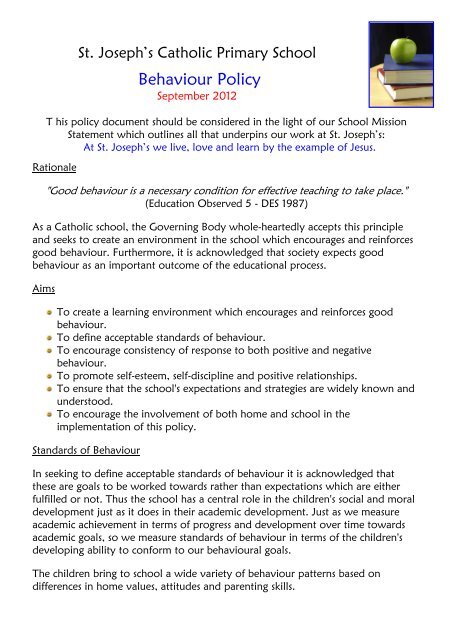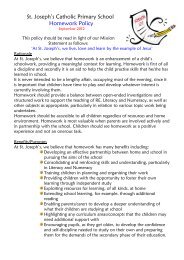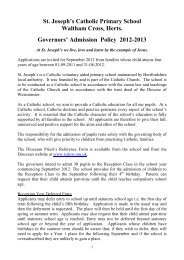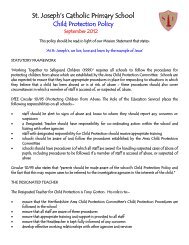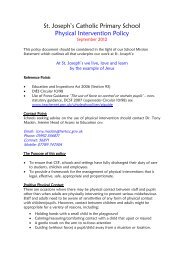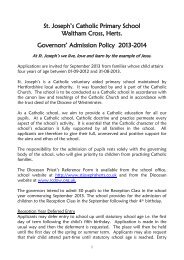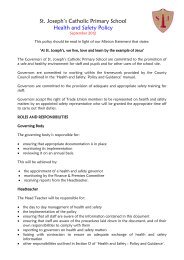Behaviour Policy - St. Joseph's Catholic Primary School
Behaviour Policy - St. Joseph's Catholic Primary School
Behaviour Policy - St. Joseph's Catholic Primary School
You also want an ePaper? Increase the reach of your titles
YUMPU automatically turns print PDFs into web optimized ePapers that Google loves.
<strong>St</strong>. Joseph’s <strong>Catholic</strong> <strong>Primary</strong> <strong>School</strong><br />
<strong>Behaviour</strong> <strong>Policy</strong><br />
September 2012<br />
T his policy document should be considered in the light of our <strong>School</strong> Mission<br />
<strong>St</strong>atement which outlines all that underpins our work at <strong>St</strong>. Joseph’s:<br />
At <strong>St</strong>. Joseph’s we live, love and learn by the example of Jesus.<br />
Rationale<br />
"Good behaviour is a necessary condition for effective teaching to take place."<br />
(Education Observed 5 - DES 1987)<br />
As a <strong>Catholic</strong> school, the Governing Body whole-heartedly accepts this principle<br />
and seeks to create an environment in the school which encourages and reinforces<br />
good behaviour. Furthermore, it is acknowledged that society expects good<br />
behaviour as an important outcome of the educational process.<br />
Aims<br />
To create a learning environment which encourages and reinforces good<br />
behaviour.<br />
To define acceptable standards of behaviour.<br />
To encourage consistency of response to both positive and negative<br />
behaviour.<br />
To promote self-esteem, self-discipline and positive relationships.<br />
To ensure that the school's expectations and strategies are widely known and<br />
understood.<br />
To encourage the involvement of both home and school in the<br />
implementation of this policy.<br />
<strong>St</strong>andards of <strong>Behaviour</strong><br />
In seeking to define acceptable standards of behaviour it is acknowledged that<br />
these are goals to be worked towards rather than expectations which are either<br />
fulfilled or not. Thus the school has a central role in the children's social and moral<br />
development just as it does in their academic development. Just as we measure<br />
academic achievement in terms of progress and development over time towards<br />
academic goals, so we measure standards of behaviour in terms of the children's<br />
developing ability to conform to our behavioural goals.<br />
The children bring to school a wide variety of behaviour patterns based on<br />
differences in home values, attitudes and parenting skills.
At school we must work towards standards of behaviour based on the basic<br />
principles of honesty, respect, consideration and responsibility. It follows that<br />
acceptable standards of behaviour are those which reflect these principles.<br />
<strong>School</strong> Ethos<br />
The adults encountered by the children at school have an important responsibility<br />
to model high standards of behaviour, both in their dealings with the children and<br />
with each other, as their example has an important influence on the children.<br />
As adults we should aim to:<br />
create a positive climate with realistic expectations;<br />
emphasise the importance of being valued as an individual within the group;<br />
promote, through example, honesty and courtesy;<br />
provide a caring and effective learning environment;<br />
encourage relationships based on kindness, respect and understanding of the<br />
needs of others;<br />
ensure fair treatment for all regardless of age, gender, race, ability and<br />
disability;<br />
show appreciation of the efforts and contribution of all.<br />
The Curriculum and Learning<br />
At <strong>St</strong>. Joseph’s, we believe that an appropriately structured curriculum and effective<br />
learning contribute to good behaviour. Thorough planning for the needs of<br />
individual pupils, the active involvement of pupils in their own learning, and<br />
structured feed- back all help to avoid the alienation and disaffection which can lie<br />
at the root of poor behaviour.<br />
It follows that lessons should have clear objectives, understood by the children, and<br />
differentiated to meet the needs of children of different abilities. Marking and<br />
record keeping can be used both as a supportive activity, providing feed-back to<br />
the children on their progress and achievements, and as a signal that the children's<br />
efforts are valued and that progress matters.<br />
Classroom Management<br />
Classroom management and teaching methods have an important influence on<br />
children's behaviour. The classroom environment gives clear messages to the<br />
children about the extent to which they and their efforts are valued. Relationships<br />
between teacher and children, strategies for encouraging good behaviour,<br />
arrangements of furniture, access to resources and classroom displays all have a<br />
bearing on the way children behave.<br />
Classrooms should be organised to develop independence and personal initiative.<br />
Furniture should be arranged to provide a environment conducive to on-task
ehaviour. Materials and resources should be arranged to aid accessibility and<br />
reduce uncertainty and disruption. Displays should help develop self-esteem<br />
through demonstrating the value of every individual's contribution, and overall the<br />
classroom should provide a welcoming environment.<br />
Teaching methods should encourage enthusiasm and active participation for all.<br />
Lessons should aim to develop the skills, knowledge and understanding which will<br />
enable the children to work and play in co-operation with others. Praise should be<br />
used to encourage good behaviour as well as good work. Wherever possible and<br />
based on the individual child, criticism should be a private matter between teacher<br />
and child to avoid resentment.<br />
Rules and Procedures (See Appendix 1)<br />
Rules and procedures are designed to make clear to the children how they can<br />
achieve acceptable standards of behaviour.<br />
Rules and procedures are intended to:<br />
be kept to a necessary minimum;<br />
be positively stated, telling the children what to do rather than what not to<br />
do;<br />
actively encourage everyone involved to take part in their development;<br />
have a clear rationale, made explicit to all;<br />
be consistently applied and enforced;<br />
promote the idea that every member of the school has responsibilities<br />
towards the whole.<br />
In September, class teachers will discuss rules for the class which will then be agreed<br />
upon and displayed to further reinforce them. Each child will then ‘sign up’ to the<br />
rules which will then be sent home with the Autumn term curriculum overview so<br />
as to inform the parents of the agreed rules.<br />
Rewards<br />
Our emphasis is on rewards to reinforce good behaviour, rather than on failures.<br />
We believe that rewards have a motivational role, helping children to see that<br />
good behaviour is valued. The commonest reward is praise, informal and formal,<br />
public and private, to individuals and groups. It is earned by the maintenance of<br />
good standards as well as by particularly noteworthy achievements. This is as true<br />
for adults as for children. Rates of praise for behaviour should be as high as for<br />
work.<br />
Recognition of the following rewards are presented publicly during assembly:-<br />
House points and certificates(Infants/Juniors)<br />
Merit stickers (Infants)
Individual teachers can incorporate various ‘house point’ based rewards into their<br />
daily/weekly reward systems.<br />
At <strong>St</strong>. Joseph’s, Golden Time is also a further reward in the Foundation <strong>St</strong>age and<br />
Key <strong>St</strong>age 1 which the children work towards throughout the week. Each child is<br />
allocated 45 minutes of Golden Time on Friday between 2:30pm and 3:15pm,<br />
unless they have lost time throughout the week due to poor<br />
behaviour/misbehaviour.<br />
Sanctions (See Appendix 1)<br />
Although rewards are central to the encouragement of good behaviour, realistically<br />
there is a need for sanctions to register the disapproval of unacceptable behaviour<br />
and to protect the security and stability of the school community. In an<br />
environment where respect is central, loss of respect, or disapproval, is a powerful<br />
punishment.<br />
The use of punishment should be characterised by certain features:-<br />
It must be clear why the sanction is being applied.<br />
It must be made clear what changes in behaviour are required to avoid future<br />
punishment.<br />
Group punishment should be avoided as they breed resentment.<br />
There should be a clear distinction between minor and major offences.<br />
It should be the behaviour rather than the person that is punished.<br />
Sanctions range from expressions of disapproval, through withdrawal of<br />
privileges, to referral to the Headteacher/Deputy Headteacher, letters to parents<br />
and, ultimately and in the last resort, exclusion (following the LEA guidelines).<br />
Most instances of poor behaviour are relatively minor and can be adequately<br />
dealt with through minor sanctions. It is important that the sanction is not out of<br />
proportion to the offence.<br />
Where anti-social, disruptive or aggressive behaviour is frequent sanctions alone<br />
are ineffective. In such cases careful evaluation of the curriculum on offer,<br />
classroom organisation and management, and whole school procedures should<br />
take place to eliminate these as contributory factors. Additional specialist help<br />
and advice from the Educational Psychologist may be necessary. This possibility<br />
should be discussed with the Headteacher.<br />
Communication and Parental Partnership<br />
At <strong>St</strong>. Joseph’s, we give high priority to clear communication within the school and<br />
to a positive partnership with parents since these are crucial in promoting and<br />
maintaining high standards of behaviour.<br />
Where the behaviour of a child is giving cause for concern it is important that all
those working with the child in school are aware of those concerns, and of the<br />
steps which are being taken in response. The key professional in this process of<br />
communication is the class teacher who has the initial responsibility for the child's<br />
welfare. Early warning of concerns should be communicated to the Headteacher so<br />
that strategies can be discussed and agreed before more formal steps are required.<br />
A positive partnership with parents is crucial to building trust and developing a<br />
common approach to behaviour expectations and strategies for dealing with<br />
problems. Parental participation in many aspects of school life is encouraged. This<br />
participation assists the development of positive relationships in which parents are<br />
more likely to be responsive if the school requires their support in dealing with<br />
difficult issues of unacceptable behaviour.<br />
The school will communicate policy and expectations to parents. Where behaviour<br />
is causing concern parents will be informed at an early stage, and given an<br />
opportunity to discuss the situation. Parental support will be sought in devising a<br />
plan of action within this policy, and further disciplinary action will be discussed<br />
with the parents.<br />
Review<br />
This policy was drawn up in conjunction with all teaching staff and will be<br />
reviewed annually.<br />
Review Date: July 2013
Appendix 1<br />
Rules and Procedures/Sanctions<br />
The following rules and procedures should be followed and the relevant sanctions<br />
applied in relation to unacceptable behaviour.<br />
It is important to ensure that the teacher is consistent in their application of these<br />
sanctions.<br />
In Class<br />
1. Initial misbehaviour - firm verbal warnings.<br />
2. Further misbehaviour within the same lesson/day – relocation within the<br />
classroom (loss of 5 minutes of Golden Time – at the teacher’s discretion) or<br />
loss of playtime.<br />
3. Further misbehaviour – inform the parent at the end of the school day.<br />
4. If the poor behaviour continues the following day/throughout the week,<br />
inform either Mr. Gorton (Key <strong>St</strong>age 2) or Mrs. Reynolds (Key <strong>St</strong>age 1) and<br />
further action will be taken (ie: withdrawal of privileges etc.)<br />
5. If the poor behaviour continues a meeting will be arranged with the parents<br />
and a member of the SLT to discuss the problems.<br />
6. If the poor behaviour still continues then a meeting will be arranged<br />
between the parents and the Headteacher.<br />
In the case of severe misbehaviour, the incident should be reported immediately to<br />
a member of the SLT.<br />
Around the <strong>School</strong>/General<br />
All staff are asked to take collective responsibility for the behaviour of all our<br />
children around the school building, especially during Lunchtime and before/after<br />
assembly. All staff should use the sanctions listed above to promote positive<br />
behaviour in/around the school.<br />
Firm but fair!!


